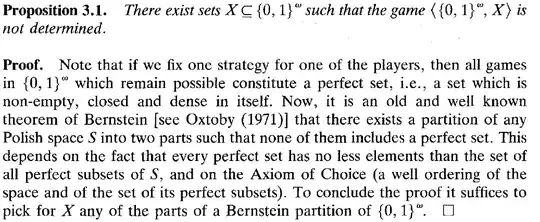Suppose that Player I uses the strategy $\sigma:\bigcup_{n\in\omega}{}^{2n}\{0,1\}\to\{0,1\}$. A game $\alpha=\langle \alpha_k:k\in\omega\rangle$ is possible iff $\alpha_{2k}=\sigma(\alpha\upharpoonright 2k)$ for each $k\in\omega$. Let $A$ be the set of possible games.
Clearly $A\ne\varnothing$. Suppose that $\alpha=\langle \alpha_k:k\in\omega\rangle\in A$. For $n\in\omega$ let $$B_n(\alpha)=\left\{\beta\in{}^\omega\{0,1\}:\beta\upharpoonright 2n=\alpha\upharpoonright 2n\right\}\;,$$ and let $$V_n(\alpha)=\{\beta\in B_n(\alpha):\beta_{2n+1}\ne\alpha_{2n+1}\}\;.$$
Then $V_n(\alpha)\cap A\ne\varnothing$, so choose $\beta^n\in V_n(\alpha)\cap A$. Clearly $\beta^n\in B_n(\alpha)\setminus\{\alpha\}$, and $\{B_n(\alpha):n\in\omega\}$ is a nbhd base at $\alpha$, so $\left\langle\beta^n:n\in\omega\right\rangle$ is a sequence in $A\setminus\{\alpha\}$ converging to $\alpha$, and $\alpha$ is not an isolated point of $A$. This shows that $A$ is dense-in-itself.
Finally, suppose that $\left\langle\alpha^n:n\in\omega\right\rangle$ is a convergent sequence in $A$ with limit $\alpha\in{}^\omega\{0,1\}$. Then for each $n\in\omega$ there is an $m\in\omega$ such that $\alpha^k\upharpoonright n=\alpha\upharpoonright n$ for each $k\ge m$; it follows that $\alpha_{2k}=\sigma(\alpha\upharpoonright 2k)$ for each $k\in\omega$ and hence that $\alpha\in A$, so $A$ is closed.
The argument for the case in which Player II’s strategy is fixed is entirely similar.
